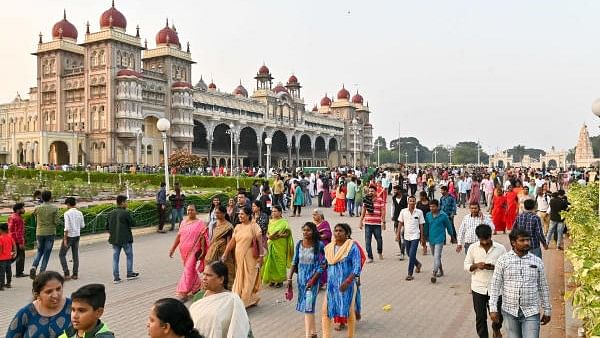
The new tourism policy envisions creating a high-quality tourist-centric ecosystem by bringing together private and public sector stakeholders with nine focus areas.
Credit: DH File Photo
Bengaluru: Cuisines, golf and weddings are among 24 themes that Karnataka will promote under a new tourism policy that was approved by the Cabinet on Monday.
Through this, the government is eyeing investments of Rs 1,500 crore and creating at least 47,000 direct and over one lakh indirect jobs in the tourism sector.
Briefing reporters after the Cabinet meeting, Tourism Minister H K Patil said Karnataka wants to attract 20 lakh foreign tourists a year and break into the top five Indian states in this category.
In domestic footfalls, Karnataka wants to be among the top three states, with a target of 48 crore from the existing 23 crore. As part of cuisine tourism, the policy proposes to develop and promote gastronomy trails by collaborating with Karnataka Wine Board to develop wine tourism packages to position the state as a premier wine tourism destination in India.
The state will collaborate with Coffee Board of India to develop Karnataka as India’s leading coffee tourism destination, the policy said.
It plans to set up an advisory group to provide guidance to and monitor progress on promotion of tourism.
“To boost domestic tourist footfall, the department will organise campaigns under the theme ‘Ullasa Pravasa,’ to encourage people to undertake short trips and weekend tours,” the policy says.
It envisions creating a high-quality tourist-centric ecosystem by bringing together private and public sector stakeholders with nine focus areas that include marketing and promotion, tourism infrastructure development, products and experiences, tourist comfort and safety, investment facilitation, etc, Patil said.
During the policy period, the department plans to monetise 680 acre of land to promote tourism in the state as well as to attract projects worth Rs 7,800 crore under public-private partnership in the next five years. The government plans to develop 30 tourist destinations under one district-one project scheme, the policy said.
The policy focuses on developing facilities such as night market, artisan village, monument illumination, sound and light show, food trails, live music venues and cultural performances to encourage visitors to stay overnight, thereby improving the economic contribution of tourism to the destination.
Leveraging its geographical diversity, the state hopes to develop 50 land, water and air-based adventure tourism destinations by 2029.
The policy seeks to organise a Global Tourism Investors’ Meet to showcase the investment potential of Karnataka tourism.
A tourism development fund, to be augmented by budgetary allocation and external sources, will be established as a strategic intervention to support the development of tourism with a primary focus on development of hospitality infrastructure and tourism land banks.
The policy proposes to offer a capital investment subsidy of up to 25% for each tourism project outside Bengaluru Urban district or within BBMP limits, with a maximum subsidy limit of up to Rs 10 crore.
It offers exemption on stamp duty, registration charges and land conversion fees for new and expansion projects.
Tourism service providers will get reimbursement of motor vehicle tax for five years on purchase of new buses and cabs. Electricity and water will be provided to homestays at domestic tariffs, while property tax prescribed for residential purposes will be levied, the policy says.